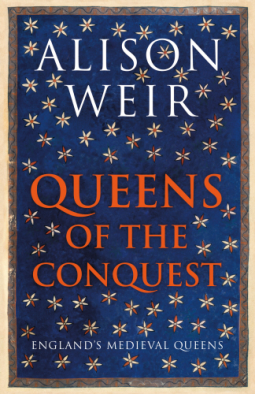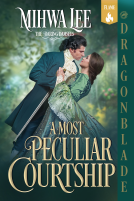
Queens of the Conquest
England’s Medieval Queens
by Alison Weir
This title was previously available on NetGalley and is now archived.
Send NetGalley books directly to your Kindle or Kindle app
1
To read on a Kindle or Kindle app, please add kindle@netgalley.com as an approved email address to receive files in your Amazon account. Click here for step-by-step instructions.
2
Also find your Kindle email address within your Amazon account, and enter it here.
Pub Date Sep 28 2017 | Archive Date Oct 28 2017
Random House UK, Vintage Publishing | Jonathan Cape
Description
A Daily Telegraph Book of the Year
The story of England’s medieval queens is vivid and stirring, packed with tragedy, high drama and even comedy. It is a chronicle of love, murder, war and betrayal, filled with passion, intrigue and sorrow, peopled by a cast of heroines, villains, stateswomen and lovers. In the first volume of this epic new series, Alison Weir strips away centuries of romantic mythology and prejudice to reveal the lives of England’s queens in the century after the Norman Conquest.
Beginning with Matilda of Flanders, who supported William the Conqueror in his invasion of England in 1066, and culminating in the turbulent life of the Empress Maud, who claimed to be queen of England in her own right and fought a bitter war to that end, the five Norman queens emerge as hugely influential figures and fascinating characters.
Much more than a series of individual biographies, Queens of the Conquest is a seamless tale of interconnected lives and a rich portrait of English history in a time of flux. In Alison Weir’s hands these five extraordinary women reclaim their rightful roles at the centre of English history.
Available Editions
| EDITION | Other Format |
| ISBN | 9781910702079 |
| PRICE | £20.00 (GBP) |
| PAGES | 512 |
Average rating from 30 members
Featured Reviews
 Alex K, Reviewer
Alex K, Reviewer
Queens of the Coqueens of the conquest is the first book in Alison Weir’s series about the lives of medieval queens. It focuses on mostly Matildas – Matilda of Flanders in Part 1, Matilda of Scotland in Part 2, Matilda of Boulogne in Part 4, Empress Maud in Part 5. The exception is Adeliza of Louvain in Part 3. As its title says, the book focuses on women that were standing (and most of the time influencing) behind the powerful men that are known to everyone.
I do not often read non-fiction and to be honest, this was the first book by Alison Weir that I have picked up and read. I did not know much about these women and Weir shows them in an interesting light. Pretty much every one of them had some influence on their respective husbands and Weir shows that in very interesting way.
Sometimes non-fiction is a chore to read since there’s a huge danger of it becoming too dry and just packed with information. This does not happen in Queens of the Conquest. Sometimes it reads almost like a fictional story and not a non-fiction book. Each of the women is described thoroughly but not boringly. While the book does mention their husbands (of course it has to), they do not feature much. The main focus is on the described women’s personality and the deeds. There’s a lot of evidence and it is obvious that the theme has been very well researched. What proves that even further is that, according to my Kindle, 25% of the book is the Appendix in which there are many further information.
I enjoyed the book very much and am certainly looking forward to reading more both of this series and of Weir’s books in general.
Queens Of The Conquest is Alison Weir at her historical non-fiction best.
Looking back at four of England's early medieval queens it is a big book and a complicated book to read as well, especially as all four queens were Matilda's which gave the potential for a great deal of confusion but luckily and thankfully Weir did her upmost to differentiate clearly between them all while ensuring that she has all of the stories flowing seamlessly together where they overlap.
I, personally, have a great love for England's kings and queens but must admit that I have never ventured this far back (apart from the odd Elizabeth Chadwick novel) so my knowledge of the times following The Battle Of Hastings was limited to pretty much names only but this huge and in depth book has taught me a great deal about how these queens ruled and lived and it truly was a fascinating story, full of love and war, treachery and deepest hatred in places. From William The Conqueror reign through to Empress Maud and beyond this is a seriously enchanting and engrossing work that I thoroughly enjoyed.
Despite being a non-fiction piece of work, it still reads with easy language and with a lovely ease and flow. This meant that the book volume wasn't a slog in the slightest. If the history of England's many kings and queens is your thing then don't miss out on this one, it needs to be read!
 Hollie B, Bookseller
Hollie B, Bookseller
This is the first part of Alison Weir's new series which looks at the lives of 5 very interesting and often overlooked Norman Queen's. It starts in 1066 with Matilda of Flanders the wife of William the conqueror. Having mostly read about the Tudor period in the past, I did not know if this book would be for me. However, Alison Weir brought these medieval queen's to life. I was not overwhelmed with boring facts , I felt like the book was written so that the reader had enough time to get to know each woman. Learning all about the things that they had to endure was very humbling. I look forward to the rest of the series.
 Ceri F, Reviewer
Ceri F, Reviewer
Being a massive Tudors geek, I’ve read and enjoyed lots of Alison Weir’s work before so I was really happy when I was offered this book to review. I love to read a good history and I was especially interested in this for its focus on the women rather than the men of the conquest (we have enough books about 1066!).
Alison Weir is the biggest-selling female historian in the UK and this book tells us once again why that is so. It’s the first of a planned quartet about the Medieval Queens of England; this volume begins with Matilda of Flanders in 1066 and takes us through to the life of the Empress Maud.
Weir describes the lives of the Queens as having “all the elements of the historical soap opera” and, after reading, this perfectly encapsulates both the positives and negatives of the book as I found it. The lives of the Queens are dramatic and full of intrigue and the source material from which the narrative is built is undoubtedly exciting. However, the source material is also scant in places and, in order to build a narrative account rather than a dry academic essay, Weir is forced to make assumptions or educated guesses about the queens – some sections are frustratingly full of phrases such as “it is likely that” rather than offering the reader any certainty. This is my only criticism as I thoroughly enjoyed the book.
The style is, as ever with Weir’s work, lively and engaging and despite the distance of time and struggle with sources I felt that she successfully pulled back the veil of history and gave a true insight into the lives of these Queens: the “beautiful and noble” Matilda of Flanders, who was repeatedly the regent of Normandy for her husband, William the Conqueror; Matilda of Scotland, the first Queen of Henry I, who loved literature, founded hospitals and was “renowned for her goodness”; Adeliza “the fair maid” of Louvain, the second Queen of Henry I, who remarried after Henry’s death and was a distant ancestor of one of my favourite Queens of England, the infamous Anne Boleyn; Matilda of Boulogne, wife of Stephen, who proved a key player and worthy opponent for none other than the Empress Maud, sole daughter of Henry I, who was the heir to the English throne in her own right.
The last pairing was the most interesting part of the narrative. A story so dominated by two women in a period of war is unusual in British History and I was completely drawn in. Weir’s talent for description meant I could imagine, for example, the Empress Maud fleeing from the siege of Oxford through the deep snow, dressed in white to camouflage herself in the blizzard. The clever use of sources to describe this incident and others, while maintaining a coherent narrative, is the best feature of the book and I was left wanting to know more about the period and the time, which is a high recommendation. I will eagerly await the remaining three books in the series and would thoroughly recommend it to all fans of history.
 Word Nerd R, Reviewer
Word Nerd R, Reviewer
Alison Weir is one of my favourite authors of ‘popular’ history. Although not an officially accredited historian, Ms Weir demonstrates her tireless efforts in the research behind her biographies, and can be relied upon to provide the facts: both those that can be proven, and educated assumptions or inferences.
Many of the Queens covered in this book are of the lesser known variety. Just about everyone recognises Eleanor of Aquitaine or Anne Boleyn; fewer are aware that the Empress Maud or Matilda of Flanders even existed, never mind who they were in any great detail. This gives us two main problems:
1. This is women’s history. As such direct evidence is harder to find, often lacking focus and open to interpretation both by modern scholars and by the many biographers and scholars who have touched this evidence since its inception.
2. Writing about less familiar personages has both a positive and a negative aspect. On the plus side there is less ‘popular opinion’ or general knowledge about any individual so you are not battling as many misconceptions about what is ‘known’ about that person. In the negative you have to be able to describe the individual, the society surrounding the individual, and their place in that society to the general reader who may not be familiar with that period of history. In addition for popular history you also have to make it interesting so that the general reader will be encouraged to finish the work.
Alison Weir is successful on both fronts. She has obviously waded through the hundreds or possibly thousands of sources of information on each individual, and this extensive research has been broken down so that even those completely unfamiliar with the person or history will be able to follow and enjoy the biography.
These types of biography will always have weak spots. Educated inferences and assumptions must be made to be able to present a full picture. When the subject is a woman this is even more necessary as the material will always be less than that available for a man of a similar status. Alison Weir has successfully produced a book that is both knowledgeable and entertaining, and most importantly, can be relied upon to be truthful as far as any historian can ascertain from limited sources.
I’d recommend this book to anyone with a general or academic interest.
 Helen S, Reviewer
Helen S, Reviewer
In Alison Weir’s new non-fiction book, Queens of the Conquest, she explores the lives of the five queens of England who followed the Norman Conquest of 1066. These five, in the order they appear in the book, are Matilda of Flanders (wife of William the Conqueror), Matilda of Scotland and Adeliza of Louvain (the two wives of Henry I), Matilda of Boulogne (wife of King Stephen), and the Empress Maud, Henry I’s daughter, who was never actually crowned but called herself Lady of the English. Lots of Matildas, then – Maud is also referred to in many sources as Matilda – but with each queen discussed chronologically (apart from where their stories overlap), things aren’t as confusing as you might imagine!
Apart from Maud, whom I have read about several times in fiction, I knew very little about the other queens whose stories are covered in this book. Considering the general lack of information available to us today – we don’t even have a clear idea of what these women looked like due to the absence of contemporary portraits – I think Weir still does a good job of providing as full and comprehensive an account of each queen’s life as she possibly could. There is inevitably a lot of padding – facts about medieval life, descriptions of castles and long passages quoted from letters – but if you don’t know a lot about the period, most of this should still be of interest.
I can’t really comment on the historical accuracy of this book as my own knowledge is very limited, but Weir does provide references to back up most of what she says. In fact, the additional material which includes the references, sources, maps etc takes up about a quarter of the book! There are still times, though, when she is forced to speculate and make assumptions about how one of the queens may have felt or behaved, and resorts to using words like ‘probably’ or ‘possibly’. Usually I prefer more certainty when I’m reading non-fiction, but in this case, I do understand that with the primary sources being so sparse, some guesswork was necessary to round out the characters of the queens and to make this into an entertaining read rather than a dry textbook.
The most enjoyable part of the book for me was the section describing the period of civil war known as the Anarchy during which Maud (who was named as her father Henry I’s heir) and Matilda of Boulogne (whose husband, Stephen, was Henry I’s nephew and another claimant to the throne) found themselves on opposite sides. As I’ve read several novels which have this period as a setting, it was good to read a factual account this time instead of a fictional one, while still recognising some of the most interesting episodes, such as Maud’s escape in the snow from the besieged Oxford Castle.
Maud certainly didn’t seem to have made herself very popular, having a reputation for being proud, haughty and arrogant, but I have always assumed that this was probably due to the prejudice of the male chroniclers of the time against a female ruler who didn’t behave the way they expected a woman to behave. Weir points out that Matilda of Boulogne often acted in a similar way but her actions were seen as acceptable because she was taking them on behalf of her husband, King Stephen, rather than for herself, but she also suggests that Maud’s overbearing attitude and poor decision-making may have been due to mood swings caused by early menopause or a long-term illness she suffered following childbirth. This was the one place where I thought there may have been some bias creeping in, as Weir clearly seems to like Matilda of Boulogne much more than the Empress – and I couldn’t help wondering what caused the aggression and lack of judgement of some of the kings mentioned in the book!
I was also interested to read the various theories and legends behind Matilda of Flanders’ marriage to William the Conqueror and the controversies surrounding Matilda of Scotland’s marriage to Henry I (she had previously spent some time in a convent so it was debatable whether or not she was free to marry). I felt that I learned very little about Adeliza, though; while she is described as being particularly beautiful and helping to promote the arts, it seemed that she had less power and political significance than the other queens.
Although I sometimes felt that too much time was devoted to the general history of the period when I would have preferred more analysis of the specific lives and characters of the five queens, I did find Queens of the Conquest a fascinating read. Apparently this is just the first of four volumes which will take us through the rest of the medieval queens to the end of the Wars of the Roses. I will be looking out for the next one.


















